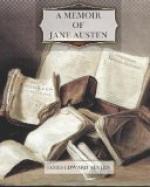The family lived in close intimacy with two cousins, Edward and Jane Cooper, the children of Mrs. Austen’s eldest sister, and Dr. Cooper, the vicar of Sonning, near Reading. The Coopers lived for some years at Bath, which seems to have been much frequented in those days by clergymen retiring from work. I believe that Cassandra and Jane sometimes visited them there, and that Jane thus acquired the intimate knowledge of the topography and customs of Bath, which enabled her to write ’Northanger Abbey’ long before she resided there herself. After the death of their own parents, the two young Coopers paid long visits at Steventon. Edward Cooper did not live undistinguished. When an undergraduate at Oxford, he gained the prize for Latin hexameters on ‘Hortus Anglicus’ in 1791; and in later life he was known by a work on prophecy, called ‘The Crisis,’ and other religious publications, especially for several volumes of Sermons, much preached in many pulpits in my youth. Jane Cooper was married from her uncle’s house at Steventon, to Captain, afterwards Sir Thomas Williams, under whom Charles Austen served in several ships. She was a dear friend of her namesake, but was fated to become a cause of great sorrow to her, for a few years after the marriage she was suddenly killed by an accident to her carriage.
There was another cousin closely associated with them at Steventon, who must have introduced greater variety into the family circle. This was the daughter of Mr. Austen’s only sister, Mrs. Hancock. This cousin had been educated in Paris, and married to a Count de Feuillade, of whom I know little more than that he perished by the guillotine during the French Revolution. Perhaps his chief offence was his rank; but it was said that the charge of ‘incivism,’ under which he suffered, rested on the fact of his having laid down some arable land into pasture—a sure sign of his intention to embarrass the Republican Government by producing a famine! His wife escaped through dangers and difficulties to England, was received for some time into her uncle’s family, and finally married her cousin Henry Austen. During the short peace of Amiens, she and her second husband went to France, in the hope of recovering some of the Count’s property, and there narrowly escaped being included amongst the detenus. Orders had been given by Buonaparte’s government to detain all English travellers, but at the post-houses Mrs. Henry Austen gave the necessary orders herself, and her French was so perfect that she passed everywhere for a native, and her husband escaped under this protection.




